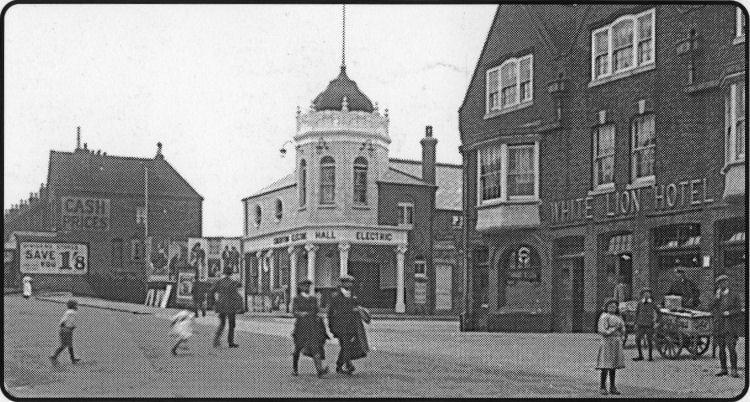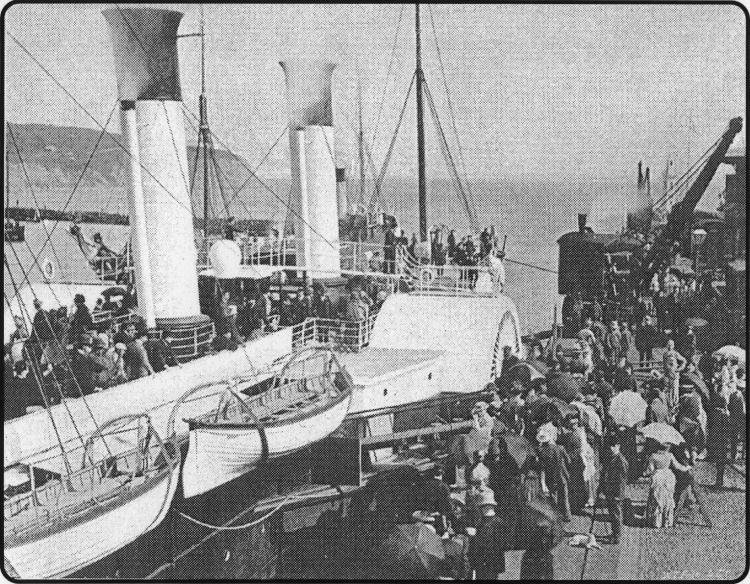
Published 14 September 2000
Leaving for sea was a sacred time in which ancient superstitions simmered
beneath the surface, The trawlerman's wife or family were enmeshed, like
their menfolk, in long-established taboos, many of them now forgotten.
A fisherman's wife dare not do the washing the day he sailed in case he was
'washed' overboard. Nor did she wave him off because a freak 'wave' would
sweep him off into the raging sea.
And no one ever said 'goodbye'
- its finality was dangerous. Likewise it was unwise to sail on a Friday. It
has religious overtones.
Even packing a seaman's sea bag had its ritual. It was unlucky to remove
anything once placed inside. One young boy who helped his father pack
recalled:
"Dad often went to sea with odd toys he was embarrassed to let the other
crewmen see!"
"Never turn back" after stepping out of the house, was another dreaded
taboo. If a vital item was forgotten, a
neighbour's lad would often be sent after the fisherman.
The boy knew the man must not break his journey.
He silently placed the item in the man's hand as he strode towards the
quayside.
And no women were allowed on the dockside as the seamen prepared to sail.
I am grateful to veteran former boatman Fred Featherbe,
Earlsfield Road, Hythe, for reminding me of such customs and superstitions
which are typical of sea folk the world over I suspect.
‘Rent Lady’
Fred, from an old Folkestone family, was reminded of these when thumbing
through some old copies he has kept of the Grimsby Evening Telegraph which
regularly publishes articles about the sea and in particular its famous
trawler base, using what must be a massive archive of historic photographs.
The recent picture of Cheriton in 1913, published in Memories a
few weeks ago (see above) was of special interest to Elizabeth Johnson, of
Kent Road, Cheriton, who writes with admiration of a team of three council
rent collectors.
Twenty years ago, she writes they became part of their client's lives, their
weekly visits being eagerly looked forward to, particularly by some of the
older folk.
She says they were caring and helpful people who called like clockwork, and
were ready and able, not only to collect the rent but to sort out tenants
problems, help All out forms (well, I could do with some of that with my
income tax!), share a piece of good news or sympathise in sad times.
"They became an important part of the lives of many lonely people as well as
happy families.'
"And when Mrs Barbara Nicholas died suddenly, a week or two back, there was
great sadness among those who knew her as the 'Rent Lady,' says Mrs Johnson.
"One of her nieces who visited her from another part of the country, after
walking with her
Superstition
A SURGE of activity used to flood through the narrow streets of the fishing
community of a small port just before high tide, in days gone by. For that
was when the fishermen or trawlermen, set to leave port for days at a time
in the quest for a decent catch of fish, were getting ready to sail.
BUSY scene at the harbour as a steamer prepares to sail. The picture, dating
from around the mid- 1890s is from a quarterly magazine Views Et Reviews,
published in 1896 by W. T. Pike & Co, of Brighton and was shown to me by
Edwin Lilley of Seabrook.
along Cheriton High Street, said with great amusement:
'It's like going out with a celebrity. People wave and smile and say
'hello.'
"And, as Eddie (one of the trio) said after her funeral. 'One had to be part
social worker, and
refer problems on. I could write a book about the situations I've walked
into!'
"Yes, Barbara was a lovely lady, kind and with a great sense of humour. She
is greatly missed," says Elizabeth, who was one of Barbara's many friends.
Well, Elizabeth, I am happy to include your tribute in Memories.
You have such beautiful handwriting. It puts mine to shame. Having said
that, I only hope I have interpreted your signature correctly!


 |
|
1900
13,000 army volunteers incampatShorncliffe.
if rtrt/\SHORNCLIFFE Camp was the training J.«/V/\/f'round for several \olunteer
regiments and nearly 13.000 were living under canvas near Cheriton
Church, the Herald reported. The troops included 400 cyclists. A
particularly fine sight was the marching into camp of the 1st Berks
Regiment over 1.300 strong, quite impressive after only a few weeks'
training. Not so impressive was the narrow Risborough Lane access to the
camp, said the editor. It was a positive scandal he declared, calling
for widening or a better access to the camp from the railway station.
Scarcely two country carts could pass each other between bank and bank
for some distance. Commenting on the successful Regatta the editor
highlighted the danger caused by lack of control of all manner of small
boats which "clustered like bees" fooling about around the controller's
boat and criss-crossing the course of the craft taking part in
competitive events. “It's a miracle there was no serious accident, he
wrote calling for police boats to keep them in order another year.
Revellers in their enthusiasm had been an intolerable nuisance. not to
mention a danger to others.
|
|
1925
Royal Victoria Hospital one of the best, says speaker.
>| QOC MAJOR event in Folkestone 75 years ago was the annual Hospital
Sunday with an open air scrvice in Radnor Park attended by hundreds of
people. It was in aid of the Royal Victoria Hospital which then depended
on public funds. Organisers of the event were the United Friendly
Societies Saturday and Sunday Fund Committee together with the British
Legion. The Sunday programme began with an impressive procession through
the town supported by many of the town's organisations, local nurses and
the bands of the Salvation Army. St John Ambulance and the British
Legion Military Band (Folkestone branch.) Guest speaker, the Revd L.G.
Grey said he had much experience of hospitals over 33 years and there
was no doubt the Royal Victoria Hospital was one of the best. The Sunday
League sponsored an excursion to the coast by rail from London at a fare
of only five shillings return (25p) and caused a flood of 3,000
visitors, most of whom, said the Herald, seemed to opt to go to
Folkestone, while others went to Dover and Deal and so on. Some went out
into the country in local buses and others attended wireless (radio)
concerts in local 'hostelrics.' At Sandgate local resident Mr N. 0.
Baker presented a 40ft mast to Sandgatc Radio Society, set up on his own
land, for a radio at the Chichester Hall.
|
|
1950
Artist raises alarm as he spots fishing boat S.0.S.
1 QKflFR0NT Pafi° P'cture in the Herald 50 X«7 91/years ago was an
unusual one - a television screen view of the ferry Isle of Thanet
entering Calais harbour on the Folkestone/Calais service. The picture
was captured by a viewer at Pedlinge. There was also a picture of the
late broadcaster Richard Dimbloby with Capt Baxter on the bridge of the
vessel. Another interesting picture in the same edition was a painting
by Victor Foley of the Dungcncss lifeboat rescue off Sandgate the
previous Saturday of the Folkestone fishing boat FE 169. belonging to
Harry Brice. Its engine stopped it was in danger of being swept ashore
and one of the crew of seven made an improvised distress signal, turning
his khaki shirt into a flag which he waved to attract attention. Artist
Victor Foley raised the alarm and launched his own dinghy and stood by
until the lifeboat arrived. Coxswain was George Tart. Magistrates
dismissed a case of alleged nuisance brought against a pigeon fancier by
two neighbours in Park Road. Hythe. who complained of "cooing and
fluttering". A woman said the flying birds frightened her and people
couldn't leave windows open for the birds would coine in. Several
neighbours signed a complaint form. The court said the man should keep
no more than two birds.
|
|
1975
Parachute ‘menace’ that cost life of scared pony.
»f Q7C A SHETLAND pony was seriously injured and I 3 had to be humanely
destroyed after an off-coursc parachutist came down and frightened her
into stampeding into a fence. And elderly owner Miss Gwen Hyde. 70, of
Lympne was concerned the same might happen to others. The parachutists
were a menace, she said. Up for sale was the 40-bedroom Ambassador,
which had been in business more than a century. The asking price was
£35.000. And the lease required that it be continued as a hotel. But
rumours that the Burlington was also for sale was strongly denied.
Nearly every church in town was represented at the induction of a new
Baptist minister, the Revd Tom Bowman at the Rendezvous Street church. A
photograph of W Reeves 'juggernauts' of the twenties which had oil-lamp
lighting to show the way. made a stark contrast to the modern day heavy
lorries in Stroller's "Around and About” page 25 years ago. Local
fishermen were in big demand to pilot Channel swimmers across the
Straits as more people than ever arrived in England to make their bids -
in the year that marked the centenary of the first ever swim by Matthew
Webb. The New Folkestone Society was urging that the proposed Sandgate
Road precinct should have, as a central feature the Weston Memorial
Fountain which was sited on the corner between Wear Bay Crescent and
Wear Bay Rd. This would return it to near its original site at West
Terrace. |
|



